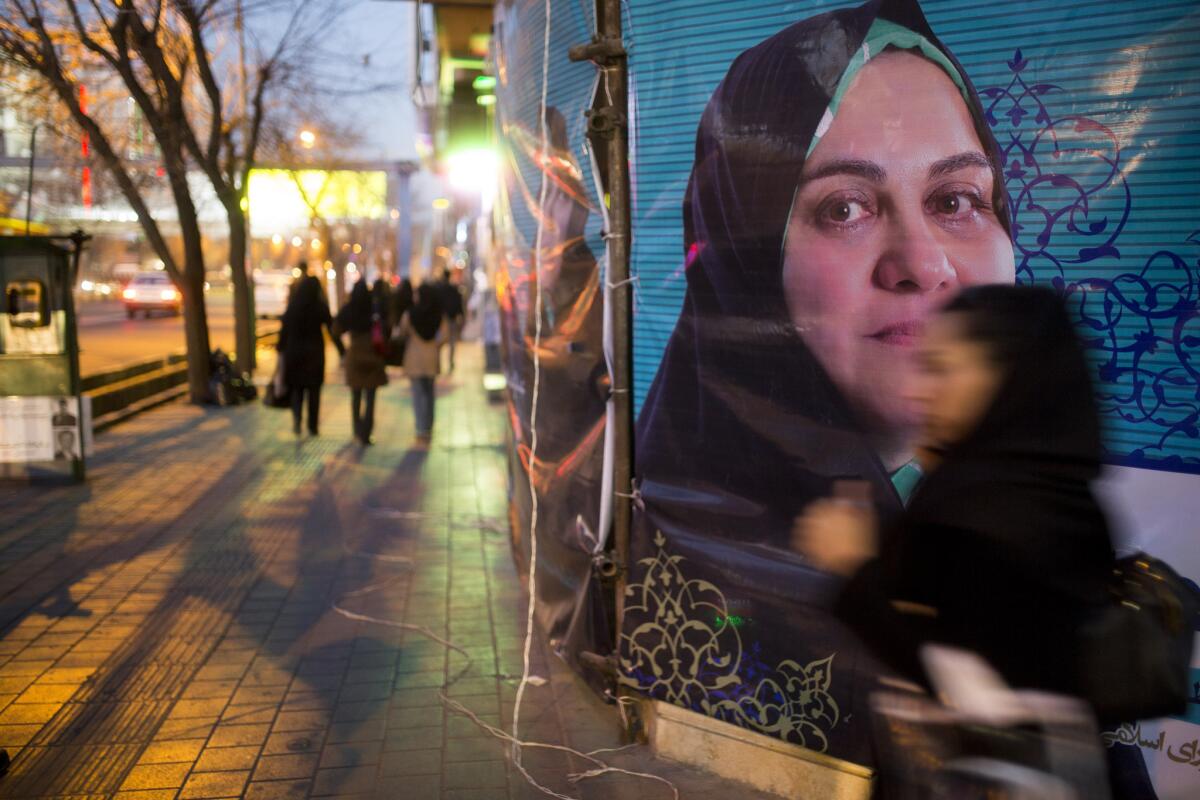Rouhani’s supporters expected to make gains as votes are counted in Iran’s election

People pass electoral posters Thursday in downtown Tehran.
- Share via
reporting from Tehran — Moderates were poised for a strong showing as votes were counted Saturday in Iranian parliamentary elections that served as a referendum on the nuclear deal Iran struck with six world powers last year.
Supporters of the deal and of President Hassan Rouhani were expected to pick up more seats in the 290-seat parliament. That could allow Rouhani to pursue further rapprochement with the West, implement some domestic reforms and attract more foreign investment — aims that had been thwarted by conservative hard-liners in the previous parliament.
While none of the several competing factions were likely to gain a majority, anti-Western conservatives and their allies were likely to retain control of the legislature — as they have since 2004 — after thousands of moderate candidates were disqualified before the vote.
In preliminary results released late Saturday, two parliamentary candidates allied with Rouhani, Mohammad Reza Aref and Ali Motahari, garnered the most votes in the Tehran constituency, the country’s largest.
Rouhani thanked the people of Iran in a statement and said, “Whatever the results, the reputation of the Islamic Republic of Iran has been enhanced.”
Voters also were selecting the 88-member Assembly of Experts, which chooses the country’s clerical supreme leader. In Iran’s hybrid political system, major decisions rest with the leader, Ayatollah Ali Khamenei.
The results released by the Interior Ministry showed that Rouhani was running second in the race for the assembly in Tehran, behind an influential ally, former President Ali Akbar Hashemi Rafsanjani.
See more of our top stories on Facebook >>
Turnout in Friday’s election was 60% of nearly 55 million eligible voters, the Interior Ministry said, a high figure that analysts said would benefit moderates and reformists. Voting was extended for several hours in some polling places as people waited in long lines to cast ballots.
Two leaders of the opposition Green Movement who are under house arrest, Mir Hossain Mousavi and his wife, Zahra Rahnavard, were supplied with ballot papers and allowed to vote Friday, according to Kalame, a website close to the movement. The move was seen as a slight relaxation of the restrictions against the reformists, who came to prominence in 2009 after a disputed election and have been in near-isolation for the past four years.
But another Green Movement leader, Mehdi Karroubi, was refused the opportunity to vote, according to reports.
The election was an important test for Rouhani, who was elected in 2013 to resolve the crisis over Iran’s disputed nuclear program, which had prompted harsh sanctions and isolated the country’s economy. The U.S. and other countries lifted the most severe sanctions after Iran complied with restrictions on its nuclear program, and although economic benefits have not yet trickled down to the average Iranian, the deal remains widely popular.
The hard-line Guardian Council tossed out thousands of candidates before the election, many of them reformists, prompting Rouhani supporters remaining in the race to form a broader alliance with moderates and conservatives who back his policies. Many Iranians said they voted against hard-liners to strengthen Rouhani’s hand in parliament.
“If I do not vote for reformists today, I will have nightmares and a guilty conscience” until the next election, said Reza Agharahimi, 28, who stood in line for an hour to cast a ballot Friday morning in an affluent neighborhood in northern Tehran, a stronghold of the reformists.
“Depriving the hard-liners of one seat in the parliament and Assembly of Experts is better than nothing,” he said.
In low-income and working-class southern districts of the capital, however, turnout was lower, as residents said they were fed up with economic struggles and saw no benefit in casting ballots.
“Why on Earth should I vote for any of them — they don’t take care of my economic needs,” said Abolfazl Hasani, a retired army colonel who was out shopping for fruit. “Any vote I made in past decades was a mistake.”
Iran’s economy has suffered badly under sanctions, and the gap between the rich and poor has widened as elites found ways to survive and even profit off the restrictions.
“In the past two years, President Rouhani’s government has tried to increase … the purchasing power of the people, but it is far from enough,” said Saeed Laylaz, an economist who supports the reformists.
Rouhani’s government says that with time, more economic opportunities will open up to Iranians as moribund industries like automobile manufacturing and natural gas are revived. The government last month struck a deal to sell oil to France and purchase a fleet of Airbus jets to resuscitate the state-owned civil aviation program.
Half the electorate is younger than 35, a demographic bulge that could boost Iran’s recovery but also could produce widespread dissatisfaction if the economy is mismanaged.
Mostaghim is a special correspondent. Times staff writer Bengali reported from Mumbai, India.
For more world news, follow @SBengali on Twitter
ALSO
California Highway Patrol needed nearly four hours to catch a runaway ‘unicorn’
While it defies U.S. government, Apple abides by China’s orders — and reaps big rewards
Rubio attacks Trump, but he’ll have to win something to get the best of him
More to Read
Sign up for Essential California
The most important California stories and recommendations in your inbox every morning.
You may occasionally receive promotional content from the Los Angeles Times.














